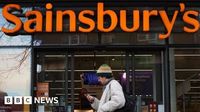Sainsbury’s, the UK’s second largest supermarket chain, has ignited a national debate by launching an eight-week trial of facial recognition technology in two of its stores, with the potential for a nationwide rollout. The move, announced on September 2, 2025, marks a significant escalation in the retail sector’s efforts to tackle what industry leaders are calling an epidemic of shoplifting and abuse against staff. But as the technology debuts at the Sydenham superstore in south-east London and Bath Oldfield Sainsbury’s Local, the initiative has drawn both applause and fierce criticism, spotlighting the difficult balance between public safety and personal privacy.
The new system, developed in partnership with Facewatch, is designed to identify and potentially ban individuals who have been violent, aggressive, or have stolen from stores. According to Sainsbury’s, the technology cross-references faces captured by in-store cameras with a database of known offenders, boasting an accuracy rate of 99.98% and issuing alerts within 60 seconds. If the software does not recognize a face as that of a reported individual, records are instantly deleted, the company says. The goal, as repeatedly emphasized by Sainsbury’s leadership, is not to monitor ordinary customers or staff, but to create a “safe, secure and welcoming environment” amid what they describe as record levels of retail crime.
Simon Roberts, Sainsbury’s chief executive, addressed both the urgency and the controversy in a statement: “We have listened to the deep concerns our colleagues and customers have and they’re right to expect us to act. The retail sector is at a crossroads, facing rising abuse, anti-social behaviour and violence. We must put safety first.” He added, “We understand that facial recognition technology can raise valid questions about data and privacy. This trial and subsequent rollout is not about monitoring colleagues or our valued customers. It’s focused solely on identifying serious offenders who have committed acts of violence, aggression, or theft, helping our teams prevent further harm.”
The context for Sainsbury’s decision is sobering. Recent figures released by the British Retail Consortium show that shoplifting offences recorded by police in England and Wales have risen to their highest level on record, surpassing half a million offences for the first time. Only 2.5% of these are recorded by police each year, with an estimated 50,000 incidents going unreported daily. Helen Dickinson, the Consortium’s chief executive, lamented, “Many retailers do not see the point of reporting incidents to the police.” This sense of frustration has been echoed across the retail sector, with many businesses increasingly turning to technology as a frontline defense.
Fellow retailers such as Home Bargains, Flannels, Costcutter, and Sports Direct have already employed similar Facewatch systems, and hundreds of shops nationwide now use facial recognition cameras linked to databases of repeat offenders. When a suspected thief enters a store, their image is checked against the database, and if there’s a match, staff are alerted. Some stores even use an audible bell to warn flagged individuals that they’ve been identified, allowing staff to monitor or approach them as necessary.
Support for Sainsbury’s initiative has come from several quarters, particularly from those concerned about the safety of retail workers. Joanne Thomas, general secretary of the USDAW union, welcomed the effort: “We welcome Sainsbury’s ongoing programme of work to protect retail workers and customers from the continued threat of abuse and violence in stores. We look forward to seeing the results of the trial of facial recognition software and will continue to work closely with Sainsbury’s to support a responsible, evidence-led approach to tackling retail crime.”
Government officials are also signaling a readiness to act. Dame Diana Johnson, Crime and Policing Minister, stated that the Home Office is working with businesses to tackle retail crime “head-on” and is considering new legislation to protect retail workers from abuse. Labour MP Alex Davies-Jones remarked on BBC Radio 4’s Today programme, “What we do know is that shoplifting has got out of hand in the country. That is why we have taken the action that we have done in our Crime and Policing Bill.”
Yet, the embrace of facial recognition technology has not come without significant backlash. Privacy campaigners and civil liberties groups have condemned the move as “chilling” and “deeply disproportionate.” Madeleine Stone, senior advocacy officer at BigBrotherWatch, was blunt in her assessment: “Sainsbury’s decision to trial Orwellian facial recognition technology in its shops is deeply disproportionate and chilling. Sainsbury’s should abandon this trial and the government must urgently step in to prevent the unchecked spread of this invasive technology.”
Concerns about potential misuse and bias are not unfounded. Earlier this year, rival supermarket Asda faced thousands of complaints after launching a similar trial. The UK’s Equality and Human Rights Commission recently criticized a Metropolitan Police plan to expand live facial recognition at mass events, citing research that found black men were more likely to trigger alerts—a finding that has fueled worries about discrimination and the broader societal implications of surveillance technology.
Sainsbury’s, for its part, has sought to reassure the public. The company insists that the system is not about indiscriminate monitoring, but about protecting staff and deterring repeat offenders. Records of individuals not recognized by the system are, the company says, immediately deleted, and alerts are only triggered for those with a history of serious criminal behavior as submitted by the store or other retailers using Facewatch. The company also emphasizes that it has worked closely with the police and government, but that incidents of theft, abuse, and threatening behavior “continue to rise,” affecting teams across the country every day.
As the eight-week trial unfolds, the eyes of both the retail industry and privacy advocates will remain fixed on Sainsbury’s. The outcome may well set the tone for how UK businesses balance the imperative of public safety with the equally vital need to protect personal privacy in an era of rapidly advancing surveillance technology. One thing is certain: the debate over facial recognition in British shops is only just beginning, and whatever happens next will have ramifications far beyond the supermarket aisles.
With the stakes high and public opinion sharply divided, Sainsbury’s experiment in facial recognition stands as a test case for the future of retail security—and for the boundaries of surveillance in everyday life.


